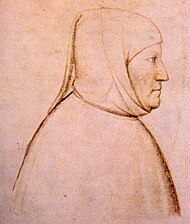Petrarch
| Francesco Petrarch | |
|---|---|

Petrarch portrait by Altichiero
|
|
| Born |
July 20, 1304 Arezzo, Italy |
| Died | July 19, 1374 (aged 69) Arquà, Italy |
| Occupation | Scholar, poet |
| Nationality | Italian |
| Period | Early Renaissance |
| Literary movement | Renaissance humanism |
| Children | Giovanni (1337–1361) Francesca (born in 1343) |
| Relatives | Eletta Canigiani (mother) Ser Petracco (father) |
Francesco Petrarca (Italian pronunciation: [franˈtʃesko peˈtrarka]; July 20, 1304 – July 19, 1374), commonly anglicized as Petrarch (/ˈpiːtrɑːrk, ˈpɛtrɑːrk/), was an Italian scholar and poet in Renaissance Italy, and one of the earliest humanists. Petrarch's rediscovery of Cicero's letters is often credited with initiating the 14th-century Renaissance. Petrarch is often considered the founder of Humanism. In the 16th century, Pietro Bembo created the model for the modern Italian language based on Petrarch's works, as well as those of Giovanni Boccaccio, and, to a lesser extent, Dante Alighieri. Petrarch would be later endorsed as a model for Italian style by the Accademia della Crusca. Petrarch's sonnets were admired and imitated throughout Europe during the Renaissance and became a model for lyrical poetry. He is also known for being the first to develop the concept of the "Dark Ages." This standing back from his time was possible because he straddled two worlds—the classical and his own modern day.
...
Wikipedia
